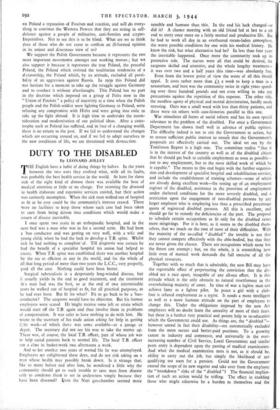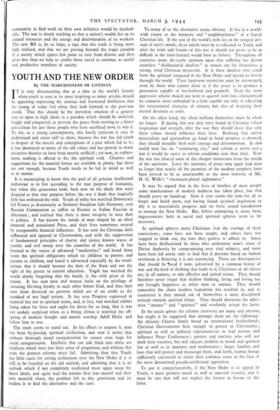DUTY TO THE DISABLED
By LEONARD JOLLEY
THE English have a habit of doing things by halves. In the years between the two wars they evolved what, with all its faults, was probably the best health service in the world. At least for those sick of the right kind of disease there was available the best of medical attention at little or no charge. For restoring the diseased to health elaborate and expensive services existed, but their action was curiously incomplete. When the sick man walked out of hospital as fit as he ever could be the community's interest ceased. There -were no facilities to keep those whom such care had been taken to cure from being driven into conditions which would make a return of disease inevitable.
I once spent two years in an orthopaedic hospital, and in the next bed was a man who was in for a second term. He had been a 'bus conductor and was getting on very well, with a wife and young child, when he had the luck to develop a T.B. spine. Whilst sick he had nothing to complain*of. Till diagnosis was certain he had the benefit of a specialist hospital his union had helped to create. When T.B. spine was established there was another hospital by the sea as efficient as any in the world, and for the whole of all that long period of more than two years the L.C.C., very properly, paid all the cost. Nothing could have been better.
Surgical tuberculosis is a desperately long-winded disease, but it usually yields in the end to good treatment, and the treatment th's man had was the best, so at the end of two interminable years he walked out of hospital as fit, for all practical purposes, as he had ever been. But fit for what? Fit to go back to be a 'bus- conductor? The surgeons would have no objection. But his former employers were scared He might receive some jolt or strain which would start off the T.B. again and thus involve them in problems of compensation. It was safer to have nothing to do with him. He wrote to the secretary of his trade union asking for help in getting li,^ht work—of which there was some available—at a garage or depot. The secretary did not see his way to take the matter up. There was, of course, the local T.B. officer, part of whose job was to help cured patients back to normal life. The local T.B. officer ran a class in basket-work two afternoons a week.
And so for another two years of wasted life he was unemployed. Employers are enlightened these days, and do not risk taking on a man whose health may possibly break down. Is it strange that, like so many before and after him, he wondered a little why the community should go to such trouble to save men from disease only to condemn them to rot in uselessness simply because they have been diseased? Even the Nazi gas-chamber seemed more sensible and humane than this. In the end his luck changed—or did it? A chance meeting with an old friend led at last to a job and to entry once more on a fairly normal and productive life. But he had to work all day. in an overheated steam-laden atmosphere, the worst possible conditions for one with his medical history. He knew the risk, but what alternative had he? In less than four years the inevitable happened. Once more the community took up its protective role. The nurses were all that could be desired, the surgeons skilled and attentive, and the whole lengthy treatment— it was over two and a half years this time—was absolutely free. Even from the lowest point of view the waste of all this should appal. It costs rather more than £3 a week to keep a man in a sanatorium, and here was the community twice in eight years spend- ing over three hundred pounds and not even willing to take any precautions against the repetition of this expense. The other side, the needless agony of physical and mental deterioration, hardly needs stressing. Ours was a small ward with less than thirty patients, and there were six others with case-histories parallel to this one.
War stimulates all forms of social reform and has its own special relevance to the, problem of the disabled. For once a Government Department has shown itself well in advance of public opinion.
The difficulty indeed is not to stir the Government to action, but to arouse sufficient public interest to ensure that the Government's proposals are effectively carried out. The ideal set out by the Tomlinson Report is a high one. The committee realise "that it is in the interest of the country as well as Of the disabled citizen
that he should get back to suitable employment as soon as possible— not to any employment, but to the most skilled work of which he is capable." The means to this end begin with the further organisa-
tion and development of specialist hospital and rehabilitation services, and include the establishment of training schemes—some of which are already doing excellent work—the setting up of an employment register of the disabled, assistance in the provision of employment under sheltered conditions for the more severely disabled, and a restriction upon the engagement of non-disabled persons by any larger employer who is employing less than a prescribed percentage quota of registered disabled persons. All this is excellent, and should go far to remedy the deficiencies of the past. The proposal to schedule certain occupations as fit only for the disabled raises more misgivings. For it is here, as it seems to the disabled them- selves, that we touch on the root of most of their difficulties. With the majority of the so-called " disabled " the trouble is not that they cannot compete effectively with the able-bodied, but that they are never given the chance. There are occupations which none but the fittest can attempt ; but, on the whole, it is astonishing how little even of manual work demands the full exercise of all the physical resources.
Together with so much that is admirable, the new Bill may have the regrettable effect of perpetuating the conviction that the dis- abled are a race apart, incapable of any all-out effort. It is this attitude which is the only obstacle to natural resettlement in the overwhelming majority of cases. In time of war a legless man can
achieve fame as a fighter pilot. In peace a girl with a club- foot is refused employment as a typist. It needs a more intelligent as well as a more humane attitude on the part of employers to change this. Under the obligations imposed by the new Act employers will no doubt learn the unreality of most of their fears, but there is a further very practical and potent help to re-education which the Government could use. As things are, the " disabled "- however unreal in fact their disability—are automatically excluded from the more secure and better-paid positions. To a growing extent in industry and commerce, and universally in the ever- increasing number of Civil Service, Local Government and similar posts entry is dependent upon the passing of medical examination. And what the medical. examination tests is not, as it should be, ability to carry out the job, but simply the likelihood of not qualifying too soon for a pension. Could not the Government extend the scope of its new register and take over from the employer the " breakdown " risks of the " disabled "? The financial implica- tion of such an action would be trifling. The effect in enabling those who might otherwise be a burden to themselves and the
community to find work on their own initiative would be incalcul- able. The war is slowly teaching us that a nation's wealth lies in its natural resources and the energy and determination of its workers. The new Bill is, let us hope, a sign that this truth is being more fully realised, and that we are passing beyond the tragic paradox of a society which spares few pains to cure from disease and then gives less than no help to enable those cured to continue as useful and productive members of society.



























 Previous page
Previous page